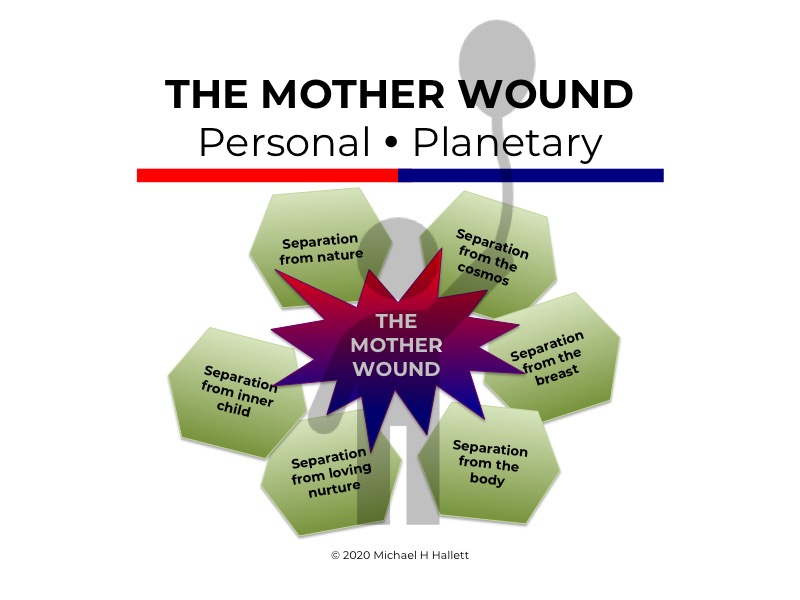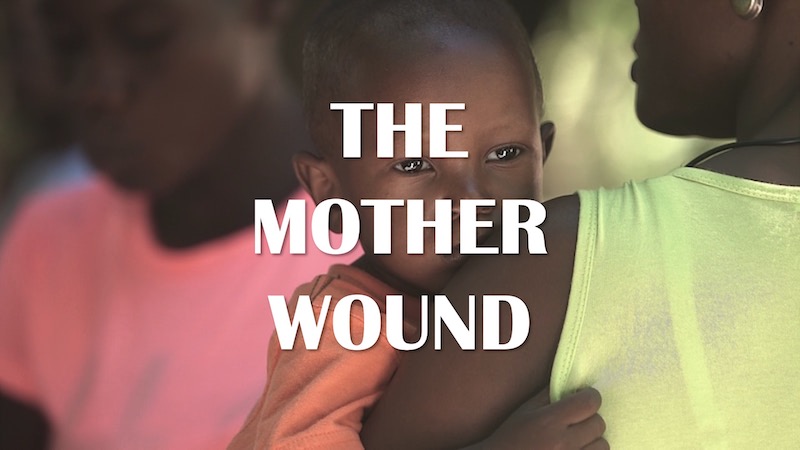How the mother wound externalises our values – and why this is critical
- 9 May 2023
- Posted by: Michael H Hallett
- Category: Cornerstones , Mother wound ,

This is the most critical blog I’ve ever written. That’s why I’ve added the tag onto the title. I don’t want to shout or catastrophise, but this is—quite literally—critical information about the human condition. You may or may not be convinced that there’s a mother wound—a single point of failure at the core of humanity. But I hope you’ll read on and discover what the externalisation of values means, and why it’s critical.
What are values?
The word ‘values’ has several meanings. From the Wikipedia entry on Value (ethics and social sciences):
“In ethics and social sciences, value denotes the degree of importance of some thing or action, with the aim of determining which actions are best to do or what way is best to live (normative ethics in ethics), or to describe the significance of different actions. Value systems are prospective and prescriptive beliefs; they affect the ethical behaviour of a person or are the basis of their intentional activities.”
I use the word in the sense of core beliefs about critical aspects of life. Values embedded in us at unconscious levels. Beliefs ingrained so deeply we have no control over them, beliefs we won’t just argue over, but are willing to fight and die for.
In this context, the values I’d like to examine are what we believe…
- Healthy nurturing looks like.
- Our relationship with nature looks like.
- Our relationship with God/the cosmos looks like.
- Appropriate use of resources looks like.
- Our relationship with our physical body looks like.
- Appropriate sexuality looks like.
This isn’t an exhaustive list, but enough to spotlight the mother wound. Because, six thousand years ago, humanity’s collective values on these questions radically altered.
The Fall
In The Fall, psychology lecturer Steve Taylor writes: “The main event in human history is a sudden, massive regression—a dramatic shift from harmony to chaos, from peace to war, from life-affirmation to gloom, or from sanity to madness.”
Cultural historian Riane Eisler calls it “a change so great, indeed, that nothing in all we know of human cultural evolution is comparable in magnitude.”
What was this seismic change?
It was the event recorded in the Bible as ‘the Fall’, which is a folk memory of localised climate change that ultimately had a global impact.
In Saharasia, geographer James DeMeo describes how prolonged drought caused desertification and famine in the equatorial belt from North Africa through the Middle East into Central Asia. This began around 6,000 years ago and took several millennia to unfold.
The first patriarchies
Famine turned peaceful hunter/gatherer or agricultural communities into nomadic warrior tribes competing for diminishing resources. The victors eventually founded the first patriarchies.
DeMeo writes: “It was in Saharasia [DeMeo’s name for this equatorial belt], during the dessication phase, that irrigation agriculture and nomadic pastoralist technology first developed… as were various forms of central-state and military apparatus.”
This was the result of a complete change in psychology and values resulting from the physiological stresses of famine.
“A passive indifference to the needs or pain of others manifested itself, and hunger, feeding of the self, became their all-consuming passion… The very old and young were abandoned to die. Brothers stole food from sisters, and husbands left wives and babies to fend for themselves. While the maternal-infant bond endured the longest, eventually mothers abandoned their weakened infants and children.”
— James DeMeo, Saharasia
The mother wound
It’s here that the mother wound occurred: famine’s impact on the mother-child bond, and the ‘first circuit’ development process that depends on it.
The first circuit sets the bar for all later processes (e.g., the ‘second circuit’ father-child development process that teaches us boundaries). They can only develop to the extent the first circuit unfolded healthily.
Once the mother-child bond breaks, holistic wellbeing ends. The impact of famine, over several thousand years, caused a sixfold fragmentation of humanity’s previously integrated and internalised value system:

The fundamental shift was from emotional connection to disconnection.
Let’s take separation from the breast as an example. In The Prehistory of Sex, Timothy Taylor writes that, “Warrior societies… often withhold colostrum from a new-born infant.”
Deprived of their highly nourishing first milk, infants become angry. Taylor explains that the infant “lacks the cognitive abilities to understand anger, so the event becomes an unconscious primal focus for aggression in later life.”
This made for better warriors at a time when survival depended on fighting ability. The child’s internal needs were deprioritised in favour of the tribe’s external need to fight.
Let’s look at the six core values I listed above and see how the Fall affected them:
Value |
Before the Fall |
After the Fall |
| Nurture | Natural development, communal belonging, good communication skills, emotionally responsible and growing, empathy with others | Arrested development, lack of community, poor communication skills, emotionally irresponsible and stagnant, lack of empathy |
| Nature | Connected, knowledgeable, in tune with its rhythms, cycles of living and dying, reverence and respect, stewardship | Disconnected, lacking knowledge, disoriented, taking without giving or replenishing, no reverence or respect, abandoned |
| God/cosmos | Connected, divinely orchestrated, part of cosmos, reason for existing and being responsible, divine child | Disconnected, accidental existence, alone, purposeless, no reason to be responsible, born sinner |
| Resources | Sharing, giving and receiving, timely, grateful, naturally drawn to conscious and responsible use | Fear, stealing, deceiving, grasping, accumulating, excess or heedless consumption, irresponsible |
| Physical body | Connected, graceful, at ease, comfort with touch, enjoyment, attuned to its wisdom, healthy | Disconnected, shameful, anxious, touch averse, only useful for work, unaware of its wisdom, unhealthy |
| Sexuality | Connected, joyful, relaxed, natural, consensual, functional, respectful, responsible, knowing, growing, realistic, divine, shaped by natural needs and desires | Disconnected, shameful, anxious, repressed, lustful, dysfunctional, fearful, voyeuristic, irresponsible, ignorant, stagnant, unskilled, naïve, shaped by rules and ideals |
Collectively, these fragmented, disconnected attitudes and behaviours comprise the mother wound. Over the last two millennia, patriarchy became the dominant global social paradigm. Most of the world’s population lives to a significant extent according to external values.
We no longer separate children from the breast. But the underlying reconnection hasn’t been made because we haven’t recognised the externalisation that happened six millennia ago and reversed it.
From internal to external values
The common denominator in the Fall’s value shifts was from internal to external. That is, from self-nurturing, self-directing and self-governing to stagnant and subject to external authority.
It’s no coincidence that as soon as humans externalised their values, previously independent and self-supporting Neolithic cultures were replaced by—annihilated by is more accurate—the “various forms of central-state and military apparatus” DeMeo describes.
Today’s world is a battleground between geopolitical rivals; militaries; political, economic, and social factions; attitudes over immigration, abortion, and other hot-button topics. All of these are external values, with each group seeking to impose the view that it benefits from onto others, using as much force as it can get away with.
The Fall may have happened six thousand years ago. It’s still playing out today because of the mother wound and the externalisation of values it inflicted on us.
Compromise
The problem with externalised values is that when an outside organisation becomes the authority in our lives—our family, our tribe, our nation, whatever—our ability to meet our internal needs is compromised.
Once that ability is compromised, we can be controlled and manipulated. Infringements are punished through shaming. To avoid being shamed, we control and manipulate ourselves.
“At first the child has to submit to the structure of the authoritarian miniature state, the family; this makes it capable of later subordination to the general authoritarian system.”
— Wilhelm Reich, The Mass Psychology of Fascism
This unconscious self-control and self-manipulation to meet our needs under the umbrella of a central state that is emotionally indifferent to us is true prostitution. Most people do it for most of their lives, completely unaware that there is an alternative.
The mother wound is the one and only issue on humanity’s to-do list. It fixes everything. Yet few people are even aware of this wound, let alone interested in healing it.
When we revert to internal values, emotional nurturing becomes the keynote. With genuine emotional nurturing, caring and sharing happen organically, as well as natural stewardship of the planet and its resources.
It’s worth noting that the currently dominant scientific materialist paradigm exonerates humanity from the responsibility for cleaning up this mess.
For information on healing the mother wound and reverting to an internal value system, please visit the Courses page.
Next steps
For further resources on the mother wound, both free and paid, please click on this image.

Photo by Kasper Rasmussen on Unsplash
